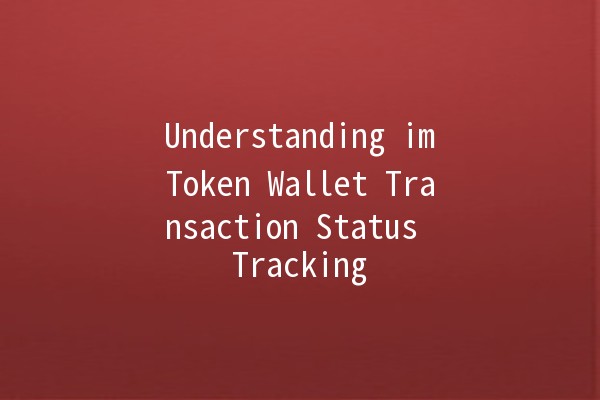In the rapidly evolving world of digital assets, having a reliable method to track your transactions is crucial for every cryptocurrency user. This article will delve into the nuances of transaction status tracking for imToken wallets, providing practical tips and insights to enhance your understanding and efficiency in managing your digital assets.
imToken is a popular Ethereum wallet that enables users to manage their cryptocurrencies and tokens seamlessly. More than just a storage solution, imToken also allows users to conduct transactions, interact with decentralized applications (DApps), and participate in various blockchain ecosystems. One of the most important aspects of using imToken is ensuring that your transactions are processed correctly and efficiently.
Monitoring the status of your transactions is essential for several reasons:

Before diving into practical tips, let’s clarify some essential terms related to cryptocurrency transactions:
Pending: The transaction has been initiated but is not yet confirmed by the network.
Confirmed: The transaction has been successfully processed and added to the blockchain.
Failed: The transaction could not be processed due to various reasons, such as insufficient gas fees or invalid addresses.
Usage: imToken provides builtin functionalities for tracking transaction statuses. You can easily check the status of your transactions within the app by navigating to your transaction history.
Example: After sending ETH to another wallet, open your imToken app, go to the "Token" tab, select your transaction history, and view the status. This clarity supports proactive management of your assets.
Usage: Leveraging blockchain explorers like Etherscan allows you to search for your transactions using your wallet address or transaction ID.
Example: If you need to confirm whether a transaction has been recorded on the blockchain, access Etherscan, enter your transaction ID in the search bar, and check the latest status updates. Etherscan provides detailed insights, including block confirmations and transaction fees, which are vital for understanding transaction dynamics.
Usage: Transactions on the Ethereum network require gas—an essential element for transaction processing. Familiarizing yourself with gas prices can help you make informed decisions about transaction timing and fees.
Example: If the gas prices are unusually high due to network congestion, you might consider waiting before initiating a major transaction. You can use tools like EthGasStation to monitor gas price trends, which assists you in optimizing your transaction costs.
Usage: To stay updated, consider setting up notifications via the imToken app or using thirdparty services that alert you to your transaction statuses.
Example: If you send a significant amount of tokens, receiving a notification upon confirmation can provide peace of mind. Check the settings in the imToken app to enable notifications for transaction statuses.
Usage: Keeping your imToken wallet updated ensures you have access to the latest features, including improved transaction tracking capabilities.
Example: After an app update, you might discover enhanced functionalities that streamline your experience in tracking transactions. Regularly check for updates on the App Store or Google Play Store to stay current.
If your transaction remains pending for an extended period, it might be stuck due to low gas fees. You can consider resending the transaction with higher gas fees or, if applicable, use the “speed up” option if offered in the imToken application.
To facilitate quicker confirmations, always set an appropriate gas price based on current network conditions. You can use resources like EthGasStation to assess optimal gas points.
Discrepancies can occur due to network propagation delays. While imToken updates periodically, blockchain explorers reflect realtime status from the blockchain, which may lead to temporary differences. Utilize both tools for the most accurate insight.
After a transaction is broadcasted on the Ethereum network, it cannot be canceled. However, you can "overwrite" a pending transaction by sending a new transaction from the same wallet with a higher gas fee, effectively accelerating the processing of the older one.
Gas fees incentivize miners to prioritize your transaction. Higher gas fees can lead to faster confirmations, especially during periods of high network traffic. It’s crucial to adjust your gas fee accordingly based on the urgency of your transaction.
Transaction failures can arise from various factors such as incorrect addresses or insufficient gas. When faced with failure, review the detailed error message, rectify any issues (like increasing gas fees), and then attempt to resend the transaction.
In the multifaceted world of cryptocurrency management, mastering transaction status tracking on platforms like imToken serves as a cornerstone for successful digital asset handling. By leveraging the features and strategies discussed, you can enhance your cryptocurrency experience, ensuring efficient and secure transactions that align with your financial goals. Continued learning and adaptation are key to navigating the exciting but often unpredictable landscape of digital currencies.